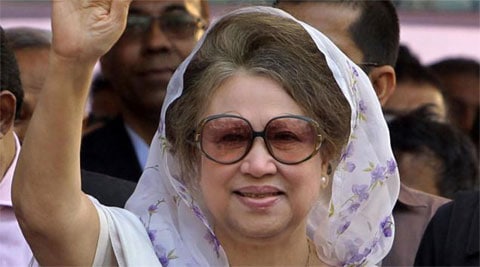Opinion Stalemate in Dhaka
Unless BNP calls off agitation, owns up for the violence, talks seem unlikely.

 Bangladesh Nationalist Party chief Khaleda Zia. (Source: AP)
Bangladesh Nationalist Party chief Khaleda Zia. (Source: AP)
West Bengal Chief Minister Mamata Banerjee is in Dhaka on a three-day visit. She will take part in the observance of “Ekushey February”, the anniversary of the death of several young men who were part of the Bengali language movement in 1952. Banerjee’s visit is crucial, given that large numbers of Bangladeshis have, in the last three years, held her responsible for scuttling the Teesta water-sharing deal. But Banerjee was at her most disarming when she landed in Dhaka Thursday evening. She described her visit as a homecoming and cheerfully quoted the lyrics of a Bengali song which had inspired Bangladeshis in their struggle for liberation from Pakistan in 1971.
Whether Banerjee will be able to reassure Dhaka on the Teesta issue remains to be seen. Even so, her visit as well as Bangladesh Prime Minister Sheikh Hasina’s invitation to her are significant — a sign of thawing ties between Dhaka and the West Bengal leadership.
But there is a larger and more immediate reality for Bangladeshis. Their disappointment with their politicians has increased since the opposition Bangladesh Nationalist Party (BNP) of Khaleda Zia and its alliance partners called a blockade around the country. The blockade, interspersed by hartals, has resulted in the death of more than 80 citizens.
The BNP, which stayed away from the general elections last year and has been out of office since 2006, is desperate to get back to power. But it has been unwilling to own responsibility for the violence or call its blockade off. Indeed, its apologists have lately even attempted to hold the ruling party responsible for the acts of violence. The BNP has now demanded that the government quit office and hand over power to a caretaker administration that will organise fresh elections.
For its part, the government continues to argue that the last election, despite the fact that as many as 153 of 300 elected MPs were returned unopposed to the Jatiya Sangsad, was conducted within the parameters of the constitution. This argument is irrefutable, despite claims by the BNP that the elections were a farce. Before the 2014 elections, the Hasina government had asserted that while the polls were necessary to maintain constitutional continuity, new elections could be held once the constitutional hurdle had been crossed. But subsequently, the government had changed tack and maintained that the next round of voting will only be in 2019, when the present parliament’s term comes to an end. This position has become more rigid after the violence reportedly unleashed by the BNP and its alliance partner, the Jamaat-e-Islami.
A number of prominent citizens have urged Hasina and Zia to resolve the crisis. The UN and the European Parliament have also been encouraging the two parties to end the impasse. Going by past experience, such efforts are unlikely to make a difference unless the BNP calls off its agitation. The government refuses to talk to the BNP, which it believes is engaging in terrorist acts. The ruling Awami League, traditionally critical of the country’s fledgling civil society because of what it has considered to be its bias towards the opposition, has been dismissive of the latter’s move to find a resolution.
The ruthlessness with which the government has been detaining senior BNP politicians has not helped matters. Senior BNP leaders like Moudud Ahmed and Jamiruddin Sircar have fallen silent. And one must not forget that the current agitation got under way when the BNP was denied permission by the authorities to organise a rally in Dhaka on January 5 to protest last year’s election and call for a new one.
There is also a growing perception that authority in the BNP may have passed from Zia’s hands into her fugitive son Tarique Rahman’s. He has been directing party activities from exile in London. Rumblings of discontent are being heard among senior party leaders. But they dare not speak out in public, lest the mother-son team penalise them.
The government, for all its shortcomings, continues to occupy the moral high ground. As it struggles to restore normal conditions in the country, it takes particular pleasure in the increasing discomfort of the BNP, whose recklessness has now tied it in knots. One question, though, worries citizens: what happens if the violence does not subside even if the BNP calls off its agitation and the government goes easy on it? One does not quite know the answer. But there is a strong suspicion that the violence is being perpetrated by workers of the Jamaat-e-Islami, the party that collaborated with the Pakistan army during Bangladesh’s War of Liberation in 1971 and is a valued partner of the BNP today.
The writer is associate editor, ‘The Daily Observer’, Dhaka
express@expressindia.com


